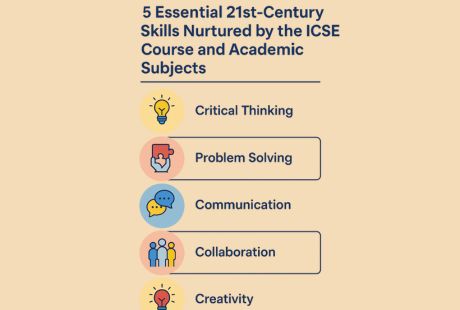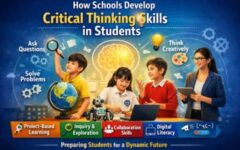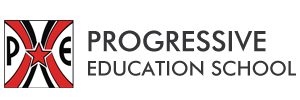5 Essential 21st-Century Skills Taught in ICSE Academics
July 8, 2025 2026-02-03 16:335 Essential 21st-Century Skills Taught in ICSE Academics
In an era defined by rapid technological advancement and unprecedented global challenges, the landscape of success is continuously shifting. The traditional emphasis on rote memorization and factual recall, while still foundational, is no longer sufficient to equip young minds for the complexities of tomorrow. Parents in Indore are increasingly seeking an education that goes beyond textbooks, one that truly future-proofs their children. At progressive ICSE school in Indore, we believe in nurturing capabilities that transcend conventional learning. Our integrated approach ensures that alongside mastering the rigorous ICSE course, students develop the indispensable 21st-century skills vital for thriving in any future endeavor.
What Are 21st-Century Skills and Why Do They Matter for Your Child?
What: 21st-century skills are a set of abilities that students need to succeed in the modern world. They encompass a broad range of competencies, often categorized into “The 4 Cs”: Critical Thinking, Creativity, Collaboration, and Communication. Beyond these, skills like digital literacy, adaptability, and resilience are equally crucial. They are not merely “soft skills” but foundational capabilities that enhance learning across all academic subjects.
Why: The world our children will inherit demands more than just knowledge.
It requires individuals who can innovate, solve complex problems, communicate effectively across diverse platforms, work seamlessly in teams, and adapt to constant change. The job market is evolving, emphasizing skills that cannot be automated. Education focused purely on factual recall, irrespective of the ICSE course or any other, can leave students unprepared. By integrating these skills into our ICSE academics, we empower children to not just pass exams but to excel in life, become lifelong learners, and contribute meaningfully to society.
1. Critical Thinking & Problem Solving: Beyond the Textbook
What: Critical thinking is the ability to analyze information objectively, evaluate arguments, identify biases, and form reasoned judgments. Problem-solving, its practical application, involves identifying challenges, generating solutions, and implementing the most effective ones.
Why: In a world saturated with information (and misinformation),
The capacity to think critically is paramount. It enables students to discern truth from falsehood, make informed decisions, and approach challenges logically. This skill is vital across all academic subjects, from dissecting literary texts to analyzing scientific data or solving complex mathematical problems. For the ICSE board syllabus, which encourages a deeper understanding, critical thinking is the backbone of true mastery
How: At Progressive Education School, critical thinking is woven into daily learning.
Instead of simply memorizing formulas, students in Mathematics are challenged with real-world problems that require analytical reasoning. In Science, inquiry-based learning encourages hypothesis formation, experimentation, and drawing conclusions from evidence. Debates and discussions in English and Social Studies foster the ability to construct logical arguments and evaluate diverse perspectives. Project-based learning, a cornerstone of our progressive approach, demands that students identify problems, research solutions, and present findings, all while honing their critical faculties.
Tips for Parents: Encourage your child to ask “why” and “how.”
Discuss current events, encouraging them to form their own opinions based on evidence, not just headlines. Involve them in family problem-solving scenarios.
2. Creativity & Innovation: Igniting the Spark
What: Creativity is the ability to generate new ideas, approaches, and solutions. Innovation is the process of putting those creative ideas into action to create value.
Why: In an increasingly automated world, human creativity remains an irreplaceable asset.
Industries thrive on new ideas, and individuals who can think innovatively are highly sought after. Creativity enhances learning in all academic subjects by allowing students to approach problems from different angles, whether it’s finding an original way to explain a concept or devising a unique solution to a design challenge. It fosters a growth mindset, essential for navigating an ever-changing world.
How: We actively cultivate creativity through a rich co-curricular program integrated with ICSE academics.
Our arts and music programs encourage self-expression and imaginative thinking. In core academic subjects, students are given open-ended assignments that encourage novel approaches. For instance, in History, they might create a short film or a graphic novel to explain an event, rather than just writing an essay. Science labs are designed for experimentation and discovery, not just following instructions. Our curriculum allows for exploration and experimentation, pushing boundaries beyond what’s explicitly defined in the ICSE board syllabus.
Tips for Parents: Encourage open-ended play. Provide art supplies, musical instruments, or building blocks. Ask “What if…?” questions. Celebrate original ideas, even if they seem unconventional.
3. Collaboration & Communication: Building Bridges
What: Collaboration involves working effectively with others to achieve a common goal. Communication is the clear and effective expression of ideas, both verbally and non-verbally, coupled with active listening.
Why: In almost every professional field, teamwork is fundamental.
The ability to collaborate effectively, share ideas, resolve conflicts, and leverage diverse strengths is paramount. Strong communication ensures that ideas are understood, feedback is constructive, and projects move forward smoothly. These skills are vital in group projects across all academic subjects and essential for future career success.
How: Our progressive ICSE environment fosters collaboration and communication daily.
Group projects are a regular feature, requiring students to delegate tasks, brainstorm together, and present their collective work. Debates, role-playing, and class presentations build confidence in public speaking and the art of persuasive communication. Students learn to give and receive constructive feedback, essential for both personal growth and professional development within our rigorous ICSE course. Cross-curricular projects often necessitate communication between different subject groups, mimicking real-world team dynamics.
Tips for Parents: Encourage group activities, sports, or clubs. Model good listening skills. Encourage your child to explain their thoughts clearly and practice resolving conflicts respectfully.
4. Digital Literacy & Media Fluency: Navigating the Connected World
What: Digital literacy is more than just knowing how to use a computer; it’s the ability to find, evaluate, create, and communicate information using digital technologies, responsibly and ethically. Media fluency involves understanding different media forms and critically assessing their messages.
Why: In our hyper-connected world, digital literacy is no longer optional.
It’s a fundamental requirement for education, work, and daily life. Students need to be able to navigate vast amounts of online information, distinguish credible sources from unreliable ones, and use digital tools to create and express themselves. This impacts research in all academic subjects and prepares them for an increasingly digital workforce.
How: Our school integrates technology thoughtfully into the ICSE academics.
Students learn to conduct effective online research, verify sources, and understand digital citizenship. They use various software and platforms for presentations, data analysis, and creative projects. We emphasize responsible online behavior, cyber safety, and the ethical implications of digital tools. Our curriculum ensures students are not just consumers of digital content but critical, responsible creators.
Tips for Parents: Discuss online safety and digital footprints. Encourage critical thinking about online information. Explore educational apps and websites together, focusing on their responsible use.
5. Adaptability & Resilience: Thriving Amidst Change
What: Adaptability is the ability to adjust to new conditions, ideas, or environments. Resilience is the capacity to recover quickly from difficulties & toughness.
Why: The only constant in the 21st century is change.
Future careers may not even exist yet, and students will face unforeseen challenges. The ability to adapt to new technologies, learn new skills rapidly, and bounce back from setbacks is crucial for navigating this dynamic world successfully. This emotional intelligence is as vital as cognitive strength in mastering the ICSE course and life’s challenges.
How: Our progressive educational philosophy cultivates adaptability and resilience by fostering a growth mindset.
We encourage students to embrace challenges as learning opportunities and to view mistakes as stepping stones, not failures. Our varied teaching methodologies expose students to different learning styles, making them flexible in their approach. Encouraging extracurricular pursuits, sports, and facing healthy competition also builds character, teaching them to cope with wins and losses, and developing perseverance far beyond the ICSE board syllabus.












